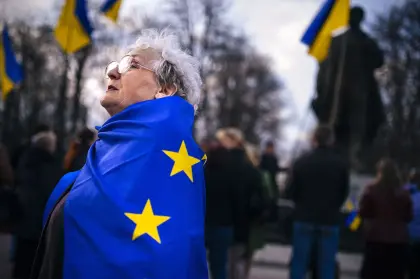On May 6, Eurobarometer, a collection of cross-country public opinion surveys conducted regularly on behalf of the EU Institutions since 1974, published the results of a new opinion polling dubbed “EU’s response to the war in Ukraine.”
Carried out on behalf of the European Commission’s Directorate-General for Communication by Ipsos European Public Affairs in each of the 27 EU Member States, it has shown an overwhelmingly positive assessment of the EU’s response to Russia’s invasion of Ukraine.
JOIN US ON TELEGRAM
Follow our coverage of the war on the @Kyivpost_official.
About 80% of the respondents agree that since the war started the EU has shown solidarity with Ukraine, with close to 60% describing the response as united and prompt. The absolute majority of respondents support providing humanitarian aid and are happy to welcome them into the EU – 93% and 88% respectively.
Also, 80% approve of economic sanctions against Russia.
When it comes to military aid, 67% fully approve and 34% tend to approve of it, with the highest levels of support coming from Finland (90%) and the lowest from Bulgaria and Cyprus – 30%- 31% respectively.
The survey has also shown that almost 80% of the respondents are personally worried about the war in Ukraine, with about nine in ten respondents feeling sympathy toward Ukrainians.
Meanwhile, over 60% of the surveyed find that Ukraine should join the EU when it is ready. The scores are especially high in Portugal, Finland, Sweden, Poland, Estonia, Lithuania, Ireland, and other countries. In countries like France, Belgium, Austria, and Greece, the support is lower, yet still pronounced.
Information consumption-wise, close to two-thirds of the respondents say that they trust info from European authorities about the war. Only 28% trust social media versus 63% who do not, with 25% distrusting it altogether.
The socio-demographic considerations prove that the difference between male and female respondents, as well as various age groups and levels of education, though present, have not had a significant impact on the answers. For instance, male respondents are somewhat more likely than their female counterparts to agree that the war in Ukraine shows the need for greater military cooperation within the EU.
Such a high level of support for Ukraine, the EU’s response to the war, including military and humanitarian aid, shows that the informational war waged by Russia against Ukraine has failed to gain ground in Europe.
Since Feb. 24, Moscow has been disseminating various messages aimed at portraying Ukraine as a Nazi state, the refugees as being socially dangerous or unwanted, and sanctions undermining unity within the EU.
It also proves that social media, where propaganda and disinformation are rife, — especially following the EU’s decision to ban RT and Sputnik, — has failed to become a go-to source for most Europeans.
The International Donor Conference organized by Poland and Sweden on May 5 in Warsaw, which resulted in raising $6,5 billion, with Polish PM Mateusz Morawiecki pledging to allocate 100 million euros of humanitarian aid to Ukraine, is another example of Russia’s informational defeat in Europe, rendering attempts to obstruct the West’s attempts to fund Ukraine’s restoration futile.
During the Conference, the Polish PM also emphasized the need to introduce a full embargo on oil and gas.
Although Hungarian PM Viktor Orban has opposed the embargo, comparing it to a nuclear bomb, the European Commission is not planning to give up on its initiative. As per reports, it looks to exempt Hungary, Slovakia, and Czechia from the ban until 2024.
You can also highlight the text and press Ctrl + Enter



